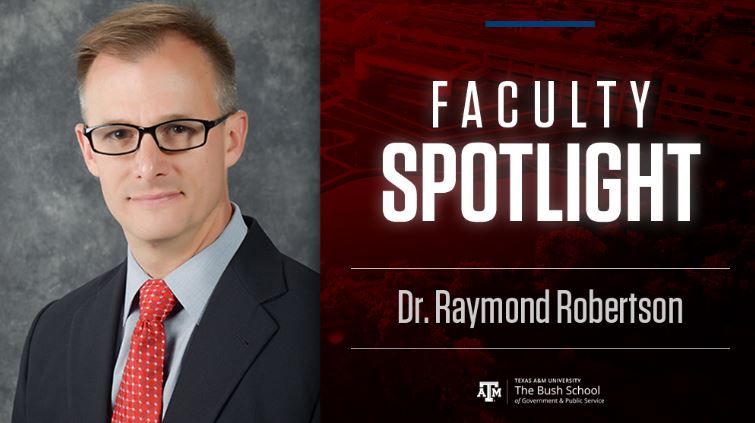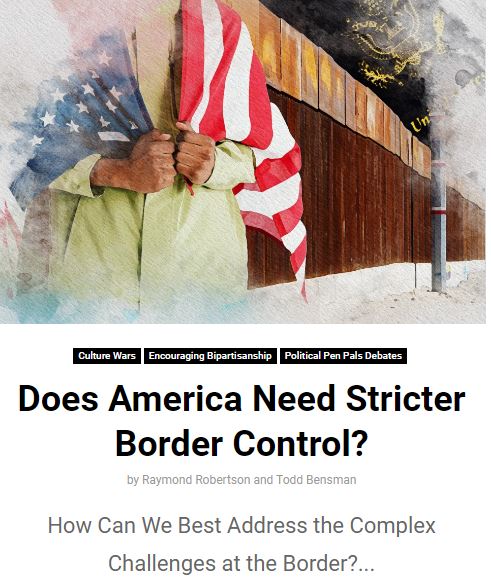A written point-counterpoint debate between Bensman and Raymond Robertson, Professor of Economics and Government, Texas A&M as published March 8, 2023 by Divided We Fall, which describes itself as “a non-profit news publication working to provide bipartisan dialogue for the politically engaged. We publish written debates between individuals who disagree in order to expose readers to different viewpoints and demonstrate productive civil discourse.“
Robertson Opening Proposition: Expanding Legal Pathways to Entry Benefits Us All
By Raymond Robertson – Professor of Economics and Government, Texas A&M

Rising immigration over the last 30 years has brought border control to the center of policy debates. The benefits of open borders from commerce to tourism have to be balanced with the costs of potential smuggling and national security risks of undocumented migration. In absolute numbers, the United States and Mexico have the most migration of all country pairs by nearly an order of magnitude. But recent surges, largely from Latin America, are at the center of the policy debate as Customs and Border Protection has reported record-high increases in the number of encounters between 2020 and 2022.
Academic research mostly shows that migrants are beneficial to the economy, associated with economic growth, and contributing to rising living standards. Very few studies show that migrants drive down wages for natives or increase unemployment. Patents, business start-ups, and entrepreneurship, for example, are all positively correlated with migration. Migrants with specific skills complement native workers and help businesses expand and reach new markets. Even low-skilled migrants boost the economy. By engaging in jobs usually not preferred by natives, less-skilled migrants free up time for more-skilled natives to engage in higher-paid activities. The complementarity of less-skilled migrants with relatively more-skilled natives is an example of how specialization via comparative advantage contributes to economic growth.
Excessive Border Control is Both Ineffective and Harmful
It is understandable that the idea of migration raises concerns about national security—the presence of foreign-born individuals who seek to harm Americans is real. However, we need not close our borders to address this issue. There exist a multitude of policy options that allow the United States to capture the economic potential offered by migrants while keeping Americans safe and secure. One example is to support agencies like Customs and Border Enforcement (CBP) and Immigration and Customs Enforcement (ICE), which are responsible for both addressing undocumented migration and minimizing smuggling at ports of entry.
An arguably more realistic approach, however, might take into account the fact that potential migrants are ultimately going to decide whether or not to relocate depending on if the costs outweigh the benefits. Most migrants are economic refugees, with some trying to escape violence but most trying to improve their earning potential and standard of living. Short of transforming the economic conditions of these migrants’ countries of origin, the most beneficial policy alternatives would seek to invest significantly in the asylum and migration processing capacity of the U.S. government. More specifically, a favorable solution to the chaotic flow of undocumented migrants would be to create a visa system that includes sufficient bureaucratic support to “regularize” the flow of migrants. A legal path for economic refugees from Central and South America eliminates the incentive to enter illegally, thus reducing the national security risk while allowing Americans to benefit from a stronger economy.
In short, only a very significant investment in the asylum and migration processing capacity of the U.S. government will reduce the flow of undocumented migration, yet it would help the United States capture the tremendous economic potential migrants offer and secure our national borders.
Bensman Response: America is Facing its Worst Border Crisis in History
By Todd Bensman – Senior National Security Fellow, Center for Immigration Studies

The recent border migration “surge” that Dr. Robertson correctly notes stands at “the center of policy debate” bears one important distinction: specific policies never before implemented in the United States have unleashed the most voluminous, unremitting mass migration event in the nation’s history by non-partisan numbers. In fiscal year 2022 alone, U.S. border authorities encountered more than two million migrants attempting to cross the border. In contrast, many past years logged totals in the 300,000 to 400,000 range. Far outside anything in the American experience, this event constitutes an extreme state of border insecurity. Specific extra-legal executive branch policies caused this state of affairs and reflect a startling ceding of national decision-making to a mass numbers of strangers.
Executive Overreach Is Undermining National Security
For the first time in contemporary United States history, an executive branch systematically neutralized almost every Congressionally-approved requirement to enforce its explicit provisions on border control. The administration all but eliminated interior deportation and most detention. It implemented ad-hoc extra-legal admittance systems that provided quick “humanitarian parole” admittance into the American interior for millions of border crossers. Most will never leave, even when their stay-time allowances expire or they lose future asylum claims, as most economic migrants do.
In the context of this strange policy backdrop, Dr. Robertson’s apt description of immigrant decision-making—that potential migrants base their decisions to cross on whether potential benefits outweigh their costs to travel—explains the greatest surge of humanity recorded since the government began keeping records. Offering further enticement to those who would gamble a run to evade Border Patrol are policies that have significantly reduced interior ICE deportation operations for every category of alien who can get beyond the 100-mile Border Patrol jurisdiction, including aggravated criminal felons. Almost anyone who could get through knew the cost of travel would almost guarantee future enjoyment of an illegal presence free of fear from capture and deportation.
What Happened to the Rule of Law?
Given the severity of the crisis, the assertion that the current state of affairs should constitute a starting line for “compromise between border control and immigration reform” is mistaken. The only “more” that should be done is that government policy should be returned as close as possible to the spirit of congressional mandates requiring immigration enforcement at the border.
Those who would assert that “immigration” in this manner is a net good for America (essentially, why not make lemonade of lemons?) tacitly argue in favor of a broad abrogation of explicit congressional statute as “compromise.” But that’s not how it works on the illegal immigration side of the coin, lest this “nation of laws” lose that proud moniker and slide to a place from which Americans want to flee.
In asserting that “migration” and “migrants” bring overarching economic benefits to the nation, Dr. Robertson fails to note the distinction between legal and illegal immigration. This mindset tacitly justifies what is essentially the current wholesale abrogation of federal immigration law enforcement. Too many make the common error of conflating “legal” and “illegal” immigration as though it is all one and the same. Dr. Robertson’s arguments about accepting more immigration for economic benefits belong only in the halls of Congress as part of debates about modifying laws and policies for legal immigration. Those who don’t like the current enforcement laws can advocate for changing them or expanding legal immigration in the legislature. But tolerance for ignoring or disrespecting them damages our democracy. If political division currently prevents successful legislative compromise, the only answer is to wait patiently and follow the law meanwhile.
Reply: Immigration Has Made America Stronger
By Raymond Robertson – Professor of Economics and Government, Texas A&M
Between 1870 and 1900, when the U.S. population stood around 75 million, 12 million migrants entered the United States. Today, the U.S. population is nearly 333 million, making the current migration surge, which Mr. Bensman and I agree is relatively large when compared to the last five years, a much smaller share of the total population. The 1870 migration surge that helped to create our great nation might be a distant or forgotten memory to some, but nevertheless stands as an example of how the United States grew and flourished by assimilating migrants seeking the opportunity to work and create a better life.
Mr. Bensman suggests that the executive branch is entirely responsible for the current surge but does not acknowledge the drivers of immigration such as the fact that Ukraine is under attack by Russia, that Venezuela and Haiti are essentially failed states, or that economic growth in Mexico and Central American states is anemic. Nor the opportunities immigration presents with the current U.S. unemployment rate at a historic low of 3.4%, or that, in many states, the number of job openings is much greater than the number of job applicants. That said, we agree that the main issue is that so many migrants are entering the country without following proper channels. While there may be many “push” and “pull” factors, we also agree that the United States needs to make investments in border control to make sure that migrants enter the country through proper channels. I, however, argue these investments should be based on reason and research, rather than fear and panic.

Final Word: The Border Control Status Quo Is Failing Americans
By Todd Bensman – Senior National Security Fellow, Center for Immigration Studies
The United States has matured since the pre-industrial, low-population America of the 1870s where empty lands needed settlement. Strong shoulders and a willingness to do settler and factory work are less needed in America’s post-industrial modern economy. Education and knowledge specialization are the primary values now. Dr. Robertson’s comparisons of then to now falter on the fact that new millions offering mainly strong backs are an obvious mismatch for the United States of the present. Like individuals, countries mature. For instance, mature America had to stand up a welfare system to care for populations unable to fit into its modern economy. Many illegal immigrants end up on welfare because they too often do not fit. Hardly settling empty lands, these new millions join large urban cities whose public spaces, welfare rolls, schools, hospitals, jails, and non-specialization service industries that are already filled. The spreading pain of unfunded burden is visible. The list of cities declaring emergencies and demanding federal bailouts—Chicago, Denver, New York, and Washington D.C. among them—is only lengthening.
As for failing states, Dr. Robertson’s presumption that only the U.S. is responsible for absorbing their populations, as though they had nowhere to go, flounders on facts. Every Ukrainian at the U.S. border passed on generous safe-haven packages from all 27 European Union nations. Super-majorities of Venezuelans and Haitians now arriving had been living, often prosperously, in nations like Chile, Brazil, and Colombia for years before U.S. policy changes opened the opportunity for lifestyle upgrades. The only answer is we must enforce the law and promote strong border control, now.
The post A Divided We Fall Organization Debate Between Bensman and A&M Prof on the Question: Does America Need Stricter Border Control? appeared first on Todd Bensman.
- JOSH HAMMER: Mob Rule Is Taking Over The West - April 2, 2023
- JUDGE ANDREW P. NAPOLITANO: Trump Can Be His Own Worst Enemy - April 2, 2023
- SHOSHANA BRYEN: Here’s What Really Lies Behind The Biden Admin’s Icy Israel Relationship - April 1, 2023
JOIN US @NewRightNetwork on our Telegram, Twitter, Facebook Page and Groups, and other social media for instant news updates!
New Right Network depends on your support as a patriot-ran American news network. Donate now



